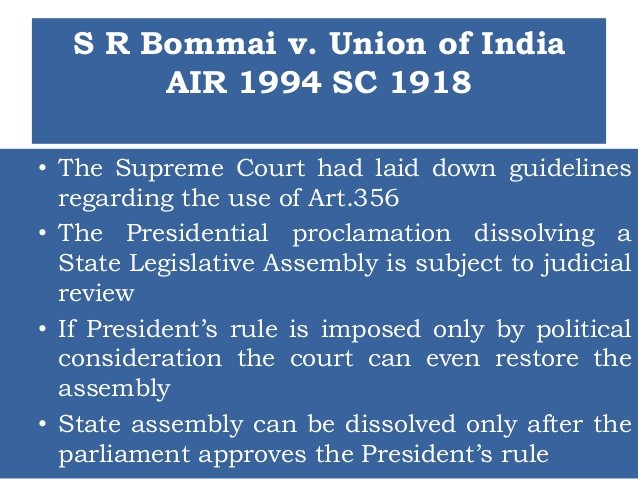Ahmedabad
(Head Office)Address : 506, 3rd EYE THREE (III), Opp. Induben Khakhrawala, Girish Cold Drink Cross Road, CG Road, Navrangpura, Ahmedabad, 380009.
Mobile : 8469231587 / 9586028957
Telephone : 079-40098991
E-mail: dics.upsc@gmail.com

SR Bommai Judgement’s and its relevance in Article 370 verdict
News: The Supreme Court’s reliance on the 1994 SR Bommai judgment was pivotal in upholding the abrogation of Article 370.
Background:
• The SR Bommai case is a landmark judgment interpreting Article 356 of the Constitution, which deals with President’s rule in states.
SR Bommai case:
• The case arose from the dismissal of the Janata Dal-led Karnataka government in 1989 by the Congress-led central government.
• Karnataka Governor P Venkatasubbaiah recommended President’s rule citing the loss of majority by Chief Minister SR Bommai and the inability of other parties to form a government.
• The move was controversial, especially as some MLAs later retracted their withdrawal of support, claiming their signatures were obtained by misrepresentation.
What was the Supreme court’s verdict?
• The Court unanimously held that the President’s proclamation is subject to judicial review on several grounds, including illegality, malafide, and abuse of power.
• The verdict mandated Parliamentary approval for imposing President’s rule. Without this approval, the dismissed government would automatically be revived after two months.
• The ruling emphasized the autonomy of states, stating that greater power at the Centre does not reduce states to mere appendages.
• It was one of the first judgments to scrutinize the Governor’s role, especially in the context of frequent impositions of President’s rule.
• Research indicates a significant decrease in the frequency of President’s rule post-SR Bommai , from an average of 2.5 times a year (1950-1994) to just over once a year (1995-2021).
How Supreme court referred to the ruling in context of Article 370?
• The main question was whether Article 370 could be abrogated while J&K was under President’s rule, which had been in place since 2018.
• The Supreme Court used the SR Bommai ruling to validate the President’s actions in J&K, applying the standards set by Justices PB Sawant and Jeevan Reddy for testing the validity of executive orders.
• The SC held that the scope of the powers of parliament under Article 356(1)(b) cannot be restricted to only law making powers of the legislature of the state. Thus, the exercise of power cannot be held mala fide merely because of it is a non-law making power or that it furthers an important federal principle.

Address : 506, 3rd EYE THREE (III), Opp. Induben Khakhrawala, Girish Cold Drink Cross Road, CG Road, Navrangpura, Ahmedabad, 380009.
Mobile : 8469231587 / 9586028957
Telephone : 079-40098991
E-mail: dics.upsc@gmail.com
Address: A-306, The Landmark, Urjanagar-1, Opp. Spicy Street, Kudasan – Por Road, Kudasan, Gandhinagar – 382421
Mobile : 9723832444 / 9723932444
E-mail: dics.gnagar@gmail.com
Address: 2nd Floor, 9 Shivali Society, L&T Circle, opp. Ratri Bazar, Karelibaugh, Vadodara, 390018
Mobile : 9725692037 / 9725692054
E-mail: dics.vadodara@gmail.com
Address: 403, Raj Victoria, Opp. Pal Walkway, Near Galaxy Circle, Pal, Surat-394510
Mobile : 8401031583 / 8401031587
E-mail: dics.surat@gmail.com
Address: 303,305 K 158 Complex Above Magson, Sindhubhavan Road Ahmedabad-380059
Mobile : 9974751177 / 8469231587
E-mail: dicssbr@gmail.com
Address: 57/17, 2nd Floor, Old Rajinder Nagar Market, Bada Bazaar Marg, Delhi-60
Mobile : 9104830862 / 9104830865
E-mail: dics.newdelhi@gmail.com